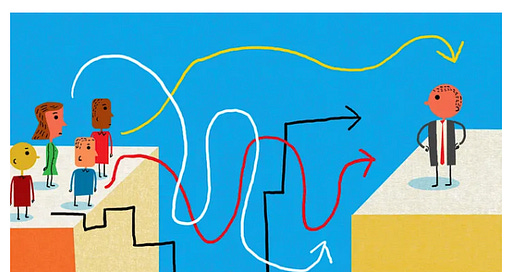One of my big theories about work, since I began working, is that work wants you to be a creature of logic — hence why we root so much of work in repeatable processes (well, that and scale). The reality is that human beings are emotional creatures, and that creates a major work dichotomy. Within that dichotomy, you get into a lot of other issues, such as “Do managers really understand, or want to manage, human emotion?” (usually that answer is “no”) and “When we talk of burnout, are we also talking of emotional exhaustion?” (usually that answer is yes). We’re all emotional people, and emotions usually have next to no place at work — people who act emotional at work tend to have stagnated careers — and that creates a lot of coping mechanisms and other issues.
This article, which is ostensibly the 17th million article written since April about how to have “tough conversations” upon “returning to the office,” makes a few good points about emotions at work. I’ll bullet point a few of them:
Anxiety (and its fully blossomed form, fear) is a response to the perceived threat of a cherished value.
We unwittingly perpetuate our anxiety when we refuse to accept that these risks demand we make value trade-offs. And anxiety decreases the instant we make a priority decision between the two by deciding which matters most.
If you refuse to make these prioritizing decisions, you risk turning your anxiety into resentment.
Entitlement is the first way we unnecessarily amplify our anxieties.
The second is neglect, when we fail to take responsibility to plan for the risks of acting on our priorities.
When we neglect our responsibility for our own values, our guilt manifests as blame toward others.
Therapists and others love to talk about “naming emotions,” and as far as business journalism goes, that’s probably one of the better examples of naming emotions I’ve ever seen — and I’ve been writing about this shit for about nine years now, so I’m somewhat of an expert. (Not really.) Let’s unpack some of this.
The role of anxiety at work
Anxiety is a huge component of work, especially in a standard hierarchy, whereby we’re forced to collaborate but promoted individually, so “doing better for your family” means you have to essentially compete with your “work family.” That’s gonna cause some anxiety. Plus: many of us have a fear of not being good enough, and that gets extrapolated at work, especially in a time of stagnated earnings and rising cost of goods. Are you delivering? Are you a success? These questions weigh on people. They cause anxiety, whether you’re discussing masks, vaccines, or anything else.
The real answer to anxiety at work is “better management,” but since that’s generally hard to come by, your best bet is some form of
Keep reading with a 7-day free trial
Subscribe to What Is Even Happening? to keep reading this post and get 7 days of free access to the full post archives.




